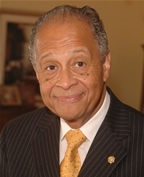Cal State Fullerton’s Role In The Nation’s Ability To Compete Globally Through Science, Technology, Engineering And Math (STEM)
January 29, 2007
Mimi Ko Cruz
By the time Cal State Fullerton President Milton A. Gordon turned 4, he already had math on his mind.
“I always loved mathematics,” Gordon said. “My mother always played number games with me from the time I was very young. She would say, ‘Milton, give me two numbers that add to five’ or six or seven and so on. I enjoyed those games and math became just kind of natural for me.”
In high school, Gordon, who grew up in Chicago, studied geometry, algebra, trigonometry and calculus with the same exuberance he showed for his mom’s math games. So, it was no surprise that he continued studying mathematics and earned his bachelor’s, master’s and doctoral degrees in the subject.
Unlike Gordon, students across the nation are not as interested in pursuing science, technology, engineering and math (STEM) disciplines.
As a result, America’s role as a leader in global competitiveness is slipping, educators, politicians and researchers agree.
In “The World is Flat,” author Thomas L. Friedman calls the erosion of America’s scientific and engineering base a crisis.
“The generation of scientists and engineers who were motivated to go into science by the threat of Sputnik in 1957 and the inspiration of [John F. Kennedy] are reaching their retirement years and are not being replaced in the numbers that they must be if an advanced economy like that of the United States is to remain at the head of the pack,” Friedman said.
The National Academy of Sciences, the National Academy of Engineering and the Institute of Medicine recently created the Committee on Prospering in the Global Economy of the 21st Century and it found that “the scientific and technical building blocks of America’s economic leadership are eroding at a time when many other nations are gathering strength.
“Thanks to globalization, driven by modern communications and other advances, workers in virtually every sector must now face competitors who live just a mouse-click away in Ireland, Finland, China, India or dozens of other nations whose economies are growing,” the committee reported.
“We are worried about the future prosperity of the United States …. This nation must prepare with great urgency to preserve its strategic and economic security.”
To that end, the committee recommends increasing the nation’s talent pool by improving elementary, high school and college science and math education and strengthening long-term research.
“The world is changing rapidly and our advantages are no longer unique,” the committee noted. “For the first time in generations, the nation’s children could face poorer prospects than their parents and grandparents did. The United States faces an enormous challenge because of the disadvantage it faces in labor costs. Science and technology provide the opportunity to overcome that disadvantage by creating scientists and engineers with the ability to create entire new industries.”
Last year, President George W. Bush introduced the American Competitiveness Initiative, which commits $5.9 billion this year and more than $136 billion over the next decade to increase investments in research and strengthening education and workforce development.
Cal State Fullerton’s role includes creating and enhancing programs and research that promote STEM study, such as the Minority Access to Research Careers (MARC) program; Mathematics, Engineering, Science Achievement (MESA) program; Study 25-35 campaign; and cell biology research. Partnerships between CSUF and community groups, such as the Fullerton Chamber of Commerce, also are forming in an effort to create a forum aimed at preparing future scientists.
In addition, the College of Education is working on establishing strategies for recruiting and preparing math and science teachers.
“It is absolutely imperative for us to increase the number of people in the STEM fields if we’re going to stay competitive in this world,” Gordon said.
“We are trying to give students who are going into the STEM fields more support because math and science are not considered attractive
to many students.”
A change in attitude is in order, he said. “We have to start with the young and create excitement in STEM fields.”
Gordon, who serves on the American Association of State Colleges and Universities’ Task Force on Mathematics and Science Enrollments, is working on a plan to do that statewide.
“The impression is that STEM fields are hard and something to fear,” he said. “But, when you think about it, simply creating a new concept in math or physics can literally change lifestyles. It’s fascinating.”
The following pages of this special report provide a glimpse of Cal State Fullerton’s efforts to support STEM study, program and outreach.


